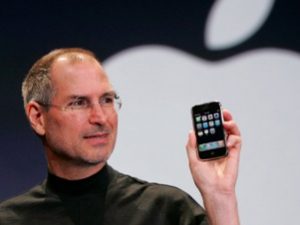iphone
The iPhone
Vocabulary
| co- | at length | conference |
| vicinity | charisma | revolutionary |
| veil (2) | on stage | turn out (2) |
| enable | transform | multipurpose |
| roll (2) | in essence | full-fledged |
| bracket | reinvent | hit the market |
| coffers | match (3) | monochrome |
| ensure | founder | in contrast |
| rival | handle (2) | overwhelming |
| willing | cash cow | profit margin |
| by far | worldwide | parameter |
| seem | generate | entrepreneurship |
| impact | location | transaction |
| local | book (2) | user-friendly |
| snag | dwindle | dependency |
| prompt | enthrall | tailor-made |
| tour | integral | inadequate |
| thrive | successor | competitor |
| rumor |




Introducing the iPhone
Ten years ago, on January 9, 2007, Apple introduced the iPhone at a Macworld conference held in the Moscone Center in San Francisco.
With his charisma, Apple co-founder and CEO Steve Jobs enthralled his audience.
He spoke at length about “three new products” which he was about to unveil on stage. These, it turned out, were rolled into a single device.
As he presented the new product, Steve Jobs spoke about reinventing the phone. Indeed Apple had transformed the simple cell phone into a multipurpose, mobile device. The iPhone in essence, was a full-fledged computer that you could use carry around and use everywhere.
The Smartphone
“The iPhone was the first-ever smartphone,” says the editor-in-chief of the Mac & i publication, Stephan Ehrmann. “It was the first cell phone with a big display that you could use to surf the web and listen to music.”
What’s completely normal for today’s smartphone users was revolutionary back then. Before the iPhone hit the markets, cell phones were rather small and not really user-friendly. Those devices only had a monochrome display, a keyboard and inadequate internet connection parameters.
Virtual keyboard
In contrast, the iPhone only has one button, but comes with a virtual keyboard that’s only displayed when you need it.
That event a decade ago ushered in the Smartphone Age. Smartphones have since become an integral part of people’s lives.
Currently in the US, seven out of ten people own a smartphone, and almost everyone in the 14-to-29 age bracket does. Kids can handle the phones just like adults know how to drive a car.
Over a Billion iPhones Sold
The design, manufacture, distribution and sale of iPhones is big business, although the overwhelming number of smartphones in use worldwide (about 80 percent) are not Apple iPhones, and run on the rival Android operating system from Google.
But for Apple itself, the iPhone is still the company’s big cash cow, with profit margins significantly higher than those of its competitors. Since its introduction 10 years ago, over a billion iPhones of different generations have been sold globally.
The iPhone is Apple’s most successful product by far,” says Stephan Ehrmann from Mac & i. “It’s generated huge profits for the company’s coffers and has made Apple the world’s most valuable company.”
For Businesses
The iPhone was also revolutionized the business world. Thomas Coleman, a tech writer covering e-business and e-entrepreneurship says that with the internet basically in everyone’s pocket, actual and potential customers were suddenly more connected to companies. Smartphone owners seem willing to buy products via online transactions.
Smartphones have also had a huge impact on the tourism sector. Location-based services enable hotel operators to localize smartphone users to make tailor-made offers to them and offer hotel rooms in their vicinity. And even whole tours are increasingly being booked and paid online, he adds.
Slow Down
But there’s a snag, says Ehrmann. The latest iPhone generation has seen dwindling sales figures, prompting Apple to slow down iPhone 7 production.
Products such as the iPad, Apple TV and the Apple Watch have not been able to match the success of the iPhone.
So how are Steve Job’s successors going to ensure that the company continues to thrive?
Ehrmann believes that the answer can be found, as always, in the creation of new products, such as the Apple Car, a self-driving electric vehicle which is rumored to hit the market in the next couple of years.
Questions
1. In 2007, Steve Jobs introduced three, separate devices. True or false?
2. Was the iPhone an advanced cell phone, a mini-computer or both?
3. What were some of the differences between the old cell phone and the new smartphone?
4. There is a difference in the smartphone market, in terms of demographics. Is this correct or incorrect?
5. Commercially, has the iPhone and Apple been successful? Does it currently dominate the smartphone market?
6. The smartphone has only revolutionized the electronics industry. Is this right or wrong?
7. Is Apple continuing to grow rapidly and prosper? What will it need to do to stay competitive and viable?
A. Have you ever owned a iPhone or other smartphone? Has it been a big difference with the old cell phone?
B. What do you and your friends use your smartphones for? Which sites, programs and apps do you use the most? Do you use them for work and school?
C. Nowadays, everyone has and uses a smartphone everywhere. What do you think?
D. Do you know anyone who is “addicted” to their smartphones?
E. Can you imagine life without smartphones?
F. What will happen in the future?

